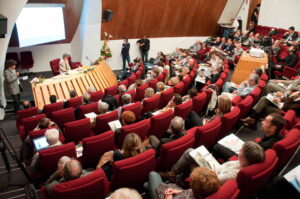PhD Defense:
Construction and directed evolution of mutualistic synthetic consortia of Bacillus subtilis
In natural ecosystems, microorganisms live in communities and interact with each other. By shaping the composition, stability, and functionality of ecosystems, microbial interactions are fundamental elements of these communities. However, the mechanisms governing these interactions remain largely unknown. One approach to studying such mechanisms is to rationally design interactions within model organisms. The aim of this work is therefore to construct synthetic consortia composed of two genetically modified strains of Bacillus subtilis to establish obligatory mutualistic interactions based on amino acid cross-feeding. The experimental approach adopted involves identifying viable consortia, characterizing their growth as well as the population dynamics that govern them, and strengthening interactions between the strains through directed evolution.
Two successive high-throughput screenings were performed to identify viable mutualistic consortia. The first, conducted with 36 strains in 384-well plates, consisted of systematically co-culturing all possible pairwise combinations of strains in minimal medium. This approach identified strains capable of exchanging the amino acids necessary for their growth. In total, 37% of the co-cultures accumulated biomass greater than 25% compared to the wild-type strain in monoculture. A representative strain of each auxotrophy was then selected for a second screening in 96-well plates. Systematic co-cultures of the 16 selected strains revealed that 50% of the consortia reached a growth rate of at least 50% of that of the wild-type strain in monoculture.
Among these consortia, three were selected, {ΔleuA;ΔpheA}, {ΔargG;ΔmetE}, {ΔlysA;ΔthrC}, for in-depth characterization of their growth dynamics and stability. Successive co-cultures of these three consortia reached up to 37 generations and were stable and reproducible, with growth rates of 0.21 h⁻¹, 0.23 h⁻¹, and 0.38 h⁻¹, respectively. Flow cytometry analysis of the population proportions within the three consortia {ΔleuA;ΔpheA}, {ΔargG;ΔmetE}, {ΔlysA;ΔthrC} revealed a stable balance specific to each consortium, with ratios of 80:20, 85:15, and 15:85, respectively. This study was then extended to 10 strains representative of each amino acid auxotrophy, showing that each consortium achieves a unique population balance, determined by the exchange capacities of its members.
The consortium {ΔlysA;ΔthrC} was then subjected to a directed evolution experiment aimed at strengthening the cooperation between the strains. A continuous culture was performed in a bioreactor for 49 days, reaching 380 generations. Analysis of the mutations accumulated in the variants identified mutations that led to enhanced mutualistic interactions between the strains, particularly through increased exchange flows of the amino acids lysine and threonine.
The high-throughput construction and analysis of mutualistic consortia carried out in this work allowed the identification of amino acid exchanges enabling the establishment of stable B. subtilis consortia over several tens of generations. These results provide a solid foundation for the study and engineering of more complex microbial communities. These synthetic approaches can be used to explore the dynamics of natural microbial communities and are applicable to bioproduction by exploiting the division of labor. The analysis of population proportions and the strengthening of metabolic interdependencies between strains observed in directed evolution enrich our fundamental understanding of mutualistic interactions and how natural selection can lead to increased diversity within microbial communities.
Jury members:
- Muriel COCAIGN-BOUSQUET (INSA Toulouse – TBI) – Rapportrice
- Fayza DABOUSSI (INSA Toulouse – TWB) – Rapportrice
- Madeleine BOUZON BLOC (Université Paris Saclay – CEA) – Examinatrice
- Guillaume CAMBRAY (Université de Montpellier – CNRS) – Examinateur
- Vincent LIBIS (Université Paris Cité – INSERM) – Examinateur
Directed by:
Anne-Gaëlle PLANSON et Matthieu JULES




